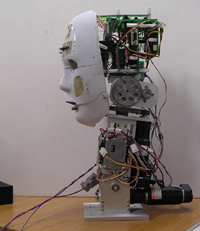Creating humanoid robots, humans doom their own civilization to destruction
Japanese scientists invent talking robot, which can independently maintain conversation with a human being
Amazing Japanese robots continue striking our imagination. Legends about the artificial intelligence, which have supposedly been invented in secret Japanese labs, evoke superstitious fear with people. The story with intelligent machines may end according to scenarios of several Hollywood blockbusters, like “Terminator” or “Matrix,” when machines conquer planet Earth and wipe humans off its face. 
News about miraculous inventions of Japanese technologists has become common in our everyday life. Barking electronic dogs, tamagochi toys are currently viewed as a part of contemporary reality. One of the latest achievements of Japanese scientists, a talking robot, is capable of saying up to 20,000 words, combining up to two billion phrases and maintaining a conversation with a person independently. Kotsu Fatuyama, a professor of the Tokyo University, believes that the sociable electronic interlocutor is the first vestige of the artificial intelligence that makes first timid steps in its original thinking.
The talking robot catches key phrases from a person's speech and models necessary questions on their basis. The robot is capable of understanding not only the sense of the phrases, but even their emotions. The smart machine receives impulses of freight, sadness, joy or indignation, analyzes them and finally produces a precise psychological reaction.
The talking robot can calm a human being down and even give a piece of advice. Several wealthy Japanese families have already acquired such an intelligent electronic friend. The memory of the robot extends with every new word or their combinations, which makes the dialogue more interesting with time.
Japan is reputed to have become the emerging civilization of robots. Every 10,000 Japanese clerks could have only eight robots 20 years ago, for example. The technological development in Japan has achieved remarkable progress: the number of robots increased from eight to almost a thousand (per 10,000 people). It brings up the idea that intelligent machines might soon oust such imperfect creatures as humans. There will probably be the time, when robots will be escorting people to shops and meeting them coming home from work.
The USA tries to keep up with Japan. Specialists of the Massachusetts Institute of Technology developed a nanny robot to help paralyzed individuals that suffered from a heart attack or other severe diseases of the musculoskeletal system. The electronic doctor can take care of a patient 24 hours a day, which is a big difference in comparison with two or three hours that human nurses usually find for them.
Researchers from the University of North Carolina developed worm robots, which can move inside vertical, horizontal and twisted pipes of various diameters. It is a small robot, outfitted with a tiny video camera and a variety of sensors, which react to light, vibration and sound. Worm robots can be used in gas and water pipes, as well as in canalization systems. Electronic worms could search for people under the rubble of a house leveled in an earthquake, or explosion, for example.
Japanese companies Mitsubishi Electric and Sumitomo Electric Industries created electronic cockroaches. Tiny robotic insects can work in various conditions, crawling through thinnest cracks, diagnosing a problem and setting forth an optimal solution.
Russian specialists of the St.Petersburg Scientific Center for Robotics and Technical Cybernetics developed a mobile robot, which renders assistance in states of emergency. “It is a radar intelligence robot MP-03, which was used during a mission of the Russian EMERCOM to Chechnya. Local residents unsealed the depository of isotopes, which caused serious damage to their health. There was a German robot used during the operation, but it went out of order immediately. The machine quickly detected radioactive sources. The robot will soon participate in international exercises in Sweden, where it will be representing Russia,” a spokesman for the St.Petersbrug-based scientific center said.
Vladimir Vorobyov, a professor of medical sciences, a senior specialist of the Center for Psychological Health of the Russian Academy of Sciences, believes that robots must not make a competition to humans. “If smart machines become an inseparable part of our everyday life, such an interception will have certain negative aspects as well. One may already see young people becoming addicted to the Internet, for instance. It is a certain psychological disorder, when a person stops comprehending the adequacy of real life. Virtual reality becomes a substitute for human communication. It is easier for such people to spend all their time on the forums or in the chat rooms. They suffer from a whole bouquet of phobias and inhibitions. Such disorders may lead to suicidal sentiments; it is a serious problem indeed,” the doctor said.
Subscribe to Pravda.Ru Telegram channel, Facebook, RSS!





